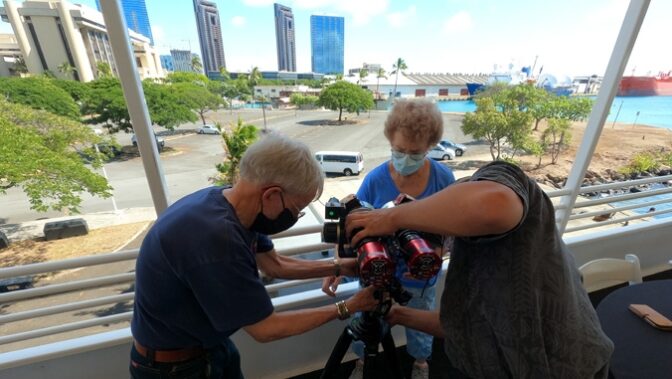By Staff Reports
The next total solar eclipse is coming on December 4, but there’s no easy way to view it because totality will be over Antarctica! For University of Hawaiʻi Institute for Astronomy (IfA) Astronomer Shadia Habbal and her eclipse team, the Solar Wind Sherpas, this is just another exciting challenge. They’ve chased eclipses around the globe, but this winter, their only observation option is by sea, and their plan is to conduct studies in the remote South Pole from the deck of a 150-foot yacht.
“It’s a once in a lifetime opportunity,” said Habbal. “We are one of a small handful of scientific teams who will carry out observations from Antarctica. We are seasoned eclipse observers, but this is the first time ever that weʻve prepared for observations from onboard a vessel.”
They’ve partnered with local company Atlantis Cruises, known for its submarine adventures off Waikīkī, to test their equipment on its vessel, the Majestic. To operate on a swaying boat deck, scientific equipment must be mounted on stabilizing platforms. On October 3, Habbal’s team deployed this equipment on the Majestic, and assessed how the instruments performed over the ocean. Weather conditions will also play a major factor in the December expedition.
“This eclipse will occur when other spacecraft, which are observing the Sun, are chartering new grounds by approaching the Sun at distances never achieved before,” Habbal said. “Obtaining observations at the same time will be of great scientific value.”
Skies darken during a total solar eclipse, which occurs when the Sun, Moon and Earth align. Habbal has led her team on 16 eclipse expeditions across the world. During the 2020 eclipse in Argentina, they discovered a double-bubble solar eruption, and observed how it triggered the Sun’s corona to go through measurable changes in temperature distribution and density. These events on the Sun’s surface can devastate the world’s power grid and impact astronauts traveling the solar system, so fully understanding their nature is important.
The use of the Waikīkī off-shore cruise yacht came as a result of IfA’s physical plant manager, Bill Unruh, who serves as the vessel’s senior naturalist during whale-watching season.

